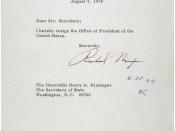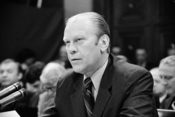Should Ford have pardoned Nixon?
President Ford should not have pardoned President Nixon. It's impossible to know if Ford pardoned Nixon for the reasons he indicated: a need to put an end to a terrible chapter in US history and because of the pain it was causing the Nixon family. However, what President Nixon did during his presidency, specifically his involvement in the Watergate affair, was illegal and unethical. I believe that pardoning him had three unintended consequences: it made people distrustful of government, it made certain people in power feel that they could act "above the law," and it destroyed any chance for President Ford to be re-elected.
By Pardoning former President Nixon, President Ford made people distrustful of government. To a certain extent, Americans have always been a bit distrustful of government. The Vietnam War contributed to an overall cynicism among Americans about their government and political leaders.
The Watergate scandal made an already skeptical America doubt the government even more. President Ford had an opportunity to take a moral stand and let Nixon face the consequences of his actions. Instead, by pardoning him, he sent a message that Nixon's actions were not that bad. This made Americans question Ford's actions and lose even more faith in their government.
By Pardoning Nixon, President Ford made certain individuals in powerful positions, in politics and business, feel that they were "above the law." Obviously, not all people in positions of power are dishonest. Nevertheless, certain people do become corrupted by power. Ford granted the former president a "full, free and absolute" pardon for "all offenses against the United States" committed between January 20, 1969 and August 9, 1974. This proposal undoubtedly empowered a small minority of individuals to feel invincible. Some people behave honestly because they know it is...


